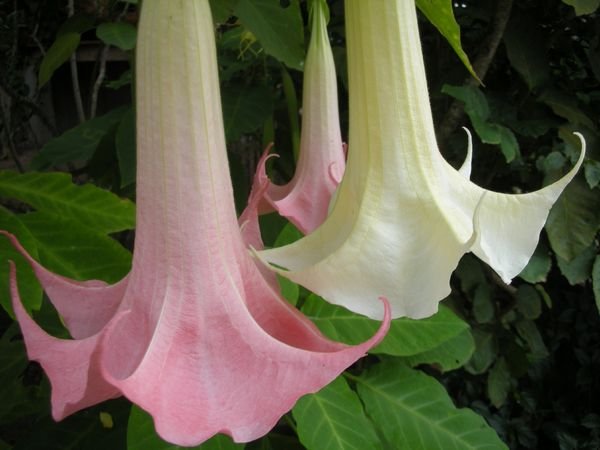Trumpet Flower-Datura-Floripondio
The so-called Angel Trumpet, whose scientific name is Brugmansia arborea, is a shrubby plant that can reach five meters in height, with pleasantly perfumed flowers that open at night and close again as soon as the sun appears, giving it a Good care is kept in bloom during most of the year. It belongs to the Solanaceae family, but despite being a relative of tomatoes, potatoes and petunias that are harmless, it is extremely toxic, especially its seeds. It is native to South America; prefers humid climates with warm days and cool nights.

The angel trumpet is known for its hallucinogenic properties, which lead to its misuse. Some adolescents and adults often try to experience its hallucinogenic effects by preparing tea from its seeds and leaves. The ingestion of the angel trumpet produces symptoms that vary from mild to very serious, depending on the part of the plant and the amount consumed. Mild symptoms include dry mouth, blurred vision, excessive thirst and dilated pupils. According to Drugs.com, reddening of the skin occurs after ingestion of the angel's trumpet.
Consumption of larger amounts of the angel trumpet leads to more symptoms of poisoning. Moderate effects include fever, agitation, headache, dizziness and mild delirium. Memory disorders often persist after ingesting this toxic plant. The heart begins to work more intensely, which raises high blood pressure and accelerates the pulse.
Ingestion of the angel's trumpet can have serious consequences. The consumption of the leaves and seeds of this plant can lead to serious symptoms of toxicity. The ingestion of large quantities of the angel's trumpet also results in more severe symptoms. It often causes the bladder and kidneys to stop working and can cause the body to stop producing and eliminating urine. Many people experience severe neurological effects, such as hallucinations, seizures and coma. More severe cases of angel trumpet poisoning result in death.
The American Society for the Prevention of Cruelty to Animals states that the ingestion of the angel's trumpet can cause adverse effects on the health of animals such as humans. Because it contains toxic substances such as hyoscyamine, atropine and scopolamine, it can produce symptoms of poisoning in animals. Animals that consume large amounts of angel trumpet can experience severe symptoms on their gastrointestinal, cardiovascular and nervous system. Keep this plant away from animals to avoid accidental poisoning.